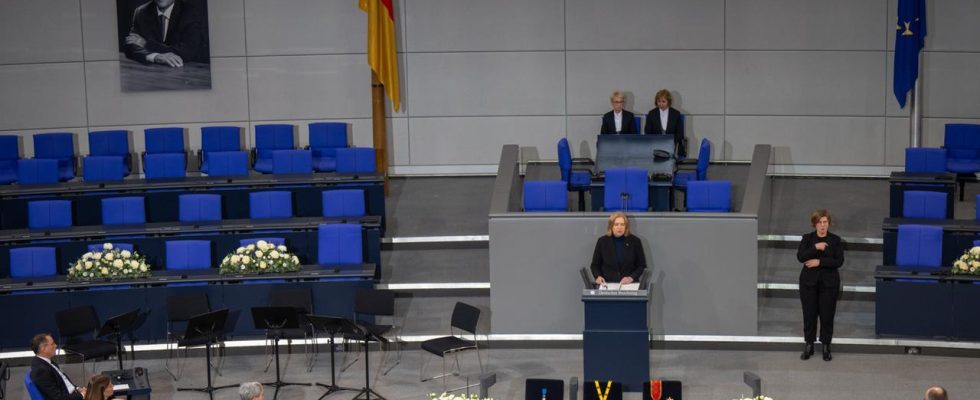The Bundestag honored the late Wolfgang Schäuble with a state ceremony. The CDU politician had sat in the German parliament for 51 years. French President Macron also took part in the memorial event.
“The typical Wolfgang Schäuble smile,” is what Bundestag President Bärbel Bas calls it in her speech: a little thoughtful, a little mischievous – that’s how Wolfgang Schäuble looks in the large photo behind the Bundestag lectern, black and white, framed by flowers.
More than 1,500 guests want to commemorate Schäuble, and not only members of parliament are sitting in parliament today, but also Federal President Frank-Walter Steinmeier, French President Emmanuel Macron, and EU Commission President Ursula von der Leyen.
“A exceptional parliamentarian”
“Germany is losing a great democrat and statesman, Europe is losing a thought leader and France is losing a friend,” says Bas. Nobody has sat in the Bundestag as long as him. When he moved into the Bundestag, the founding generation was still there.
Schäuble was an exceptional parliamentarian who overcame political setbacks and personal blows of fate and kept going. He didn’t take anyone’s word for it, he always spoke with conviction and impressed them with his subtle sense of humor. “In the end he had become an authority – across party lines.”
Merz remembers Schäuble’s greatest achievements
In his speech, CDU leader Friedrich Merz listed the many stations on Schäuble’s political path: Interior Minister, Finance Minister, President of the Bundestag. Schäuble was a gifted speaker and passionate parliamentarian who left his mark on German politics. Not only because he played a key role in writing the treaty for German unity, but also because he advocated that Berlin should become the capital instead of Bonn: “Without Wolfgang Schäuble, we probably wouldn’t be in this city and not in this house.”
Schäuble always knew how important personal encounters were in politics, especially at the European level: “He could be very tough in matters and that not only made him new friends – for example in the financial crisis. But his dealings were always fair, he was always ready to listen respectfully to his counterpart and he was always ready to seek compromises in the interests of Europe.”
Collaboration with France was always particularly important to him. It is therefore a nice sign that the state ceremony is now taking place on the day on which the German-French friendship treaty was signed 61 years ago.
Macron speaks in German
Emmanuel Macron begins his speech with a surprise. He says in German: “Germany has lost a statesman. Europe has lost a pillar. France has lost a friend.”
Macron tells in German how Schäuble learned French in his youth and discovered his passion for France. Macron talks about the Elysée Treaty and the “master builders of Europe,” which included Schäuble. Only after several minutes did he switch to French – by then the first of the guests had already taken off the simultaneous interpreter’s headphones.
Macron traces how Schäuble stood up for Europe and for France and ends again in German. For Schäuble, this “great European”, life was divided into a “before” and an “after” due to the attack on him. “Now a new afterward begins for us,” said Macron: “An afterward without Wolfgang Schäuble. Let’s accept this legacy and be up to the task!”
Schäuble died on Boxing Day. He has since been buried in his hometown of Offenburg.
Sabine Henkel, ARD Berlin, tagesschau, January 22nd, 2024 8:49 a.m

